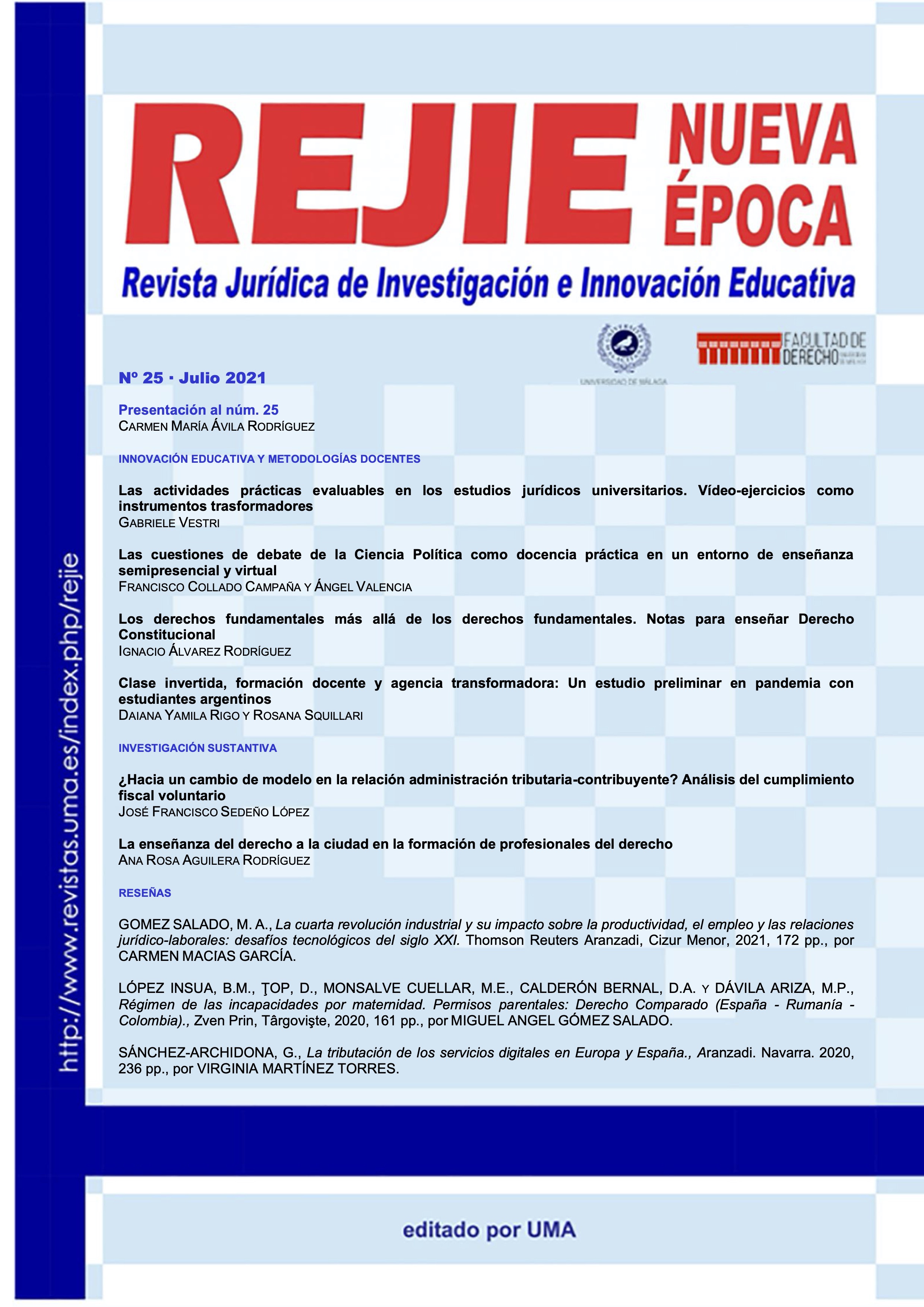Flipped classroom, teacher education and transformative agency: A preliminary study in pandemic with Argentine students
DOI:
https://doi.org/10.24310/REJIE.2021.vi25.13102Keywords:
teacher education, agency, flipped classroom, ICTAbstract
This paper is founded on a study which had the objective of comprehending the expressions of a group of students faced with the challenge of participating in a flipped classroom experience, as a way to rethink ICTs in future teaching practicing. And how the transforming agency allows to rethink the teacher’s future roll by incorporating new teaching methodologies involving technology. The study was attended by students enrolled in the career of the Faculty in Legal, Political and Social Sciences, from an Argentine university. The research was developed under the guidelines of programmatic interventions that aim to generate bridges between theory and educational practice. For data collection, a questionnaire with open questions was used that investigated the students' expressions about inverted class and transformative agency. The results show that the participants managed to generate ruptures with encapsulated educational practices in order to incorporate pedagogical approaches that include ICT in the teaching and learning processes. It is concluded that the analyses provide a contribution to rethink higher education and initial teacher training in the face of the new challenges that digital resources mark in the information society.
Downloads
Metrics
References
- MEDINA RIVILLA, A. (2020). Criterios para el diseño y mejoras curriculares de los planes de estudio universiatrio. Análisis del EES. En Trillo, F. (Coord.). Repensando la educación superior. Miradas expertas para promover el debate (pp. 39-67). Madrid: Narcea.
- AUSUBEL, D. NOVAK, J. y HANESIAN, H. (1983). Psicología educativa. Un punto de vista cognoscitivo. México. Editorial Trillas.
- RIGO, D. (2020). “Percepciones del estudiantado argentino de nivel superior acerca del compromiso, clima del aula virtual y tendencias a futuro: entre posibilidades y limitaciones en tiempos de pandemia”. Innovaciones Educativas, Vol. 22(Especial), Págs. 143 - 161. https://doi.org/10.22458/ie.v22iEspecial.3132
- RIGO, D., RICCETTI, A. (2020). “Innovar y comprometer en los espacios de formación docente universitario. Estudios sobre el modelo de enseñanza invertida en el profesorado en educación física”. ECO. Revista Digital de Educación y Formación del profesorado, Vol. 17. http://revistaeco.cepcordoba.es/wp-content/uploads/2020/03/Rigo.pdf
- RIGO, D. Y., SQUILLARI, R., CARABALLO, M. R., ROVERE, R. (2021). “Revisión teórica del concepto agencia. Implicancias educativas para comprender el compromiso académico”. Ciencia y Educación, Vol. 5, Núm. 2, Págs. 81-92. https://doi.org/10.22206/cyed.2021.v5i2.pp81-92
- RIGO, D., PAOLONI, P. (2019). “Compromiso con la formación inicial de docentes Clase invertida y TIC”. Revista de Innovación y Buenas Prácticas Docentes, Vol. 8, Núm. 2, Págs. 102-115. https://doi.org/10.21071/ripadoc.v8i2.12171
- BREVIK, L., GUDMUNDSDOTTIR, G., LUND, A., STRØMME, T. (2019). “Transformative agency in teacher education: Fostering professional digital competence”. Teaching and Teacher Education, Vol. 86, Págs. 102875. https://doi.org/10.1016/j.tate.2019.07.005
- BURBULES, N., CALLISTER, T. (2001). Educación: riesgos y promesas de las nuevas tecnologías. Barcelona: Granica.
- CARSON, L., HONTVEDT, M., LUND, A. (2021). “Student teacher podcasting: Agency and change”. Learning, Culture and Social Interaction, Vol. 29, Págs. 100514. https://doi.org/10.1016/j.lcsi.2021.100514.
- DAM?A, C., LANGFORD, M., UEHARA, D., SCHERER, R. (2021). “Teachers’ agency and online education in times of crisis”. Computers in Human Behavior, Vol. 121, Págs. 106793. https://doi.org/10.1016/j.chb.2021.106793
- DE SOUSA SANTOS, B. (2020). La cruel pedagogía del virus / Prólogo de María Paula Meneses. Ciudad Autónoma de Buenos Aires, Argentina: CLACSO. Recuperado de: http://209.177.156.169/libreria_cm/archivos/La-cruel-pedagogia-del-virus.pdf.
- DUSSEL, I. (2020). “La formación docente y los desafíos de la pandemia”. Revista EFI. Dossier Educación, Formación docente y Tecnologías. Hacer escuela en tiempo de excepcionalidad, Vol. 6, Núm. 10, Págs. 11-25. http://ppct.caicyt.gov.ar/index.php/efi/issue/view/1016/showToc
- ENGESTRÖM, Y. (2000). “From individual action to collective activity and back: Developmental work research as an interventionist methodology”. In Luff, P. Hindmarsh, J. y Heath, C. (Eds.), Workplace studies. Cambridge University Press.
- ENGESTRÖM, Y. (2011). “From design experiments to formative interventions”. Theory & Psychology, Vol. 21, Núm. 5, Págs. 598-628. https://doi.org/10.1177/0959354311419252
- ENGESTRÖM, Y., SANNINO, A. (2016). “Expansive learning on the move: Insights from ongoing research / El aprendizaje expansivo en movimiento: aportaciones de la investigación en curso”. Infancia y Aprendizaje, Vol. 39, Núm. 3, Págs. 401-435. https://doi.org/10.1080/02103702.2016.1189119
- ENGESTRÖM, Y., SANNINO, A., VIRKKUNEN, J. (2014). “On the methodological demandsof formative interventions”. Mind, Culture, and Activity, Vol.21, Núm. 2, Págs. 118–128.
- ENGLUND, C., PRICE, L. (2018). “Facilitating agency: the Change Laboratory as an intervention for collaborative sustainable development in higher education”. International journal for academic development, Vol.23, Núm. 3, Págs., 192-205 https://doi.org/10.1080/1360144X.2018.147883
- ESCORIAZA, S. ESTELLER, F., JALIL, J. M. y SCIFO, G. (2015). Argentina y las tecnologías de la información y la comunicación en la educación. Trabajo de Investigación. Mendoza: Universidad nacional de Cuyo. https://bdigital.uncu.edu.ar/objetos_digitales/7147/39-escoriazaestellerjaliliscifo-tesisfce.pdf
- ESTEBAN-GUITART, M., MOLL, L. C. (2014). “Lived experience, funds of identity and education”. Culture & Psychology, Vol. 20, Núm. 1, Págs. 70–81. https://doi.org/10.1177/1354067X13515940
- GURAYA, S. Y. (2020). “Transforming laparoendoscopic surgical protocols during the COVID-19 pandemic; big data analytics, resource allocation and operational considerations”. International journal of surgery (London, England), Vol. 80, Págs. 21–25. https://doi.org/10.1016/j.ijsu.2020.06.027
- GUTIÉRREZ, K., PENUEL, W. (2014). “Relevance to practice as criterion for rigor”. Educational Researcher, 43(1), pp. 19-23. https://doi.org/10.3102/0013189X13520289
- HAAPASAARI, A., ENGESTRÖM, Y., KEROSUO, H. (2016). “The Emergence of Learners' Transformative Agency in a Change Laboratory Intervention”. Journal of education and work,29(2), 232-262. https://doi.org/10.1080/13639080.2014.900168
- HUMRICKHOUSE, E. (2021). “Flipped classroom pedagogy in an online learning environment: A self-regulated introduction to information literacy threshold concepts”. The Journal of Academic Librarianship, Vol., 47, Núm. 2, Págs. 102327. https://doi.org/10.1016/j.acalib.2021.102327
- LION, C. (2019). Los desafíos y oportunidades de incluir tecnologías en las prácticas educativas. Análisis de casos inspiradores. Buenos Aires: IIPE UNESCO, oficina para América Latina. https://www.buenosaires.iiep.unesco.org/sites/default/files/archivos/An%C3%A1lisis%20comparativos%20-%20Pol%C3%ADticas%20TIC%20-%20Carina%20Lion.pdf
- LIPPONEN, L., KUMPULAINEN, K. (2011). “Acting as accountable authors: Creating interactional spaces for agency work in teacher education”. Teaching and Teacher Education, Vol. 27, Núm. 5, Págs. 812-819. https://doi.org/10.1016/j.tate.2011.01.001
- LORICO, D. S., LAPITAN, J. R., TIANGCO, C., SUMALINOG, D. A., SABARILLO, N., DIAZ, J. M. (2021). “An effective blended online teaching and learning strategy during the COVID-19 pandemic”. Education for Chemical Engineers, Vol. 35, Págs. 116–131. https://doi.org/10.1016/j.ece.2021.01.012
- LUND, A., VESTØL, J. M. (2020). “An analytical unit of transformative agency: Dynamics and dialectics”. Learning, Culture and Social Interaction. Vol. 25, Págs. 100390, https://doi.org/10.1016/j.lcsi.2020.100390
- MACCAGNO, A. P. (2017). “La implementación del Programa Conectar Igualdad: una mirada desde las percepciones de los directivos”. Reflexión Académica en Diseño y Comunicación, Vol. XVIII, Núm. 32, Págs. 103-118. https://fido.palermo.edu/servicios_dyc/publicacionesdc/vista/detalle_articulo.php?id_articulo=13553&id_libro=649
- MÄKITALO, A. (2016). “On the notion of agency in studies of interaction and learning”. Learning, Culture and Social Interaction, Vol. 10, Págs. 64–67. https://doi.org/10.1016/j.lcsi.2016.07.003
- OPAZO FAUNDEZ, A. R., ACUÑA BASTIAS, J. M., ROJAS POLANCO, M. P. (2016). “Evaluación de Metodología flipped classroom: primera experiencia”. Innoeduca. International Journal of Technology and Educational Innovation, Vol. 2, Núm. 2, Págs. 90-99. https://doi.org/10.20548/innoeduca.2016.v2i2.2030
- PRADA-NÚÑEZ, R., HERNÁNDEZ-SUÁREZ, C., MALDONADO-ESTEVEZ, E. (2020). “Diagnóstico del potencial de las redes sociales como recurso didáctico en el proceso de enseñanza en época de aislamiento social”. Revista ESPACIOS, Vol. 41, Núm. 42, Págs. 260-268. https://www.revistaespacios.com/a20v41n42/20414222.html
- RAMÍREZ, M. (2015). “Del ocio al empoderamiento de las TIC en la educación”. Actas De Periodismo y Comunicación, Vol. 1, Núm. 1. https://perio.unlp.edu.ar/ojs/index.php/actas/article/view/2957/2553
- RANDO BURGOS, E. (2021). “La necesaria formación del profesorado universitario ante la docencia virtual”. REJIE: Revista Jurídica de Investigación e Innovación Educativa, Vol. 24, Págs. 47-56. http://www.revistas.uma.es/index.php/rejie
- RINAUDO, M. C. (2007) “Investigación educativa. Ideas para pensar la formación de investigadores”. En Donolo, D., y Rinaudo, M. C. (2007), Investigación en educación: aportes para construir una comunidad más fecunda (pp. 55-84). Buenos Aires: La Colmena.
- RODRÍGUEZ SABIOTE, C., LORENZO QUILES, O., HERRERA TORRES, L. (2005). “Teoría y práctica del análisis de datos cualitativos. Proceso general y criterios de calidad”. Revista Internacional de Ciencias Sociales y Humanidades, SOCIOTAM, Vol. XV, Núm. 2, Págs. 133-154. https://www.redalyc.org/articulo.oa?id=65415209
- ROS GÁLVEZ, A., ROSA GARCÍA, A. (2014). “Vídeos docentes de Microeconomía: análisis de su impacto externo e interno”. Historia y Comunicación Social, Vol. 18, Págs. 75-84. https://doi.org/10.5209/rev_HICS.2013.v18.43949
- SABULSKY, G. (2020). “Del determinismo tecnológico al bricolaje digital. Sentidos y prácticas en tensión”. Revista EFI. Dossier Educación, Formación docente y Tecnologías. Hacer escuela en tiempo de excepcionalidad, Vol. 6, Núm. 10, Págs. 27-43. http://ppct.caicyt.gov.ar/index.php/efi/issue/view/1016/showToc
- YAMAZUMI, K. (2009). “Expansive Agency in Multi-Activity Collaboration”. En Sannino, A., Daniels, H. y Gutiérrez, K. (ed.), Learning and Expanding with Activity Theory (pp. 212-227). Cambridge University Press.
Additional Files
Published
How to Cite
Issue
Section
License
Sin perjuicio de lo dispuesto en el Texto Refundido de la Ley de Propiedad Intelectual, aprobado por Real Decreto Legislativo 1/1996, de 12 de abril, y conforme al mismo, los autores/as ceden a título gratuito, de modo no exclusivo y sin límite temporal los derechos para difundir, reproducir, comunicar y distribuir, en cualquier formato actual o futuro (papel o electrónico), a la Universidad de Málaga (UMA), a fin de que sea publicado en REJIE Nueva Época.
Al realizar el envío, el autor declara que el contenido esencial del mismo no ha sido publicado ni se va a publicar en ninguna otra obra o revista mientras esté en proceso de evaluación en REJIE Nueva Época, comprometiéndose en todo caso a comunicar de inmediato al equipo editorial de la revista cualquier proyecto de publicación de dicho texto, y citando expresamente a la revista en el nuevo proyecto.
Todos los contenidos publicados por REJIE Nueva Época están sujetos a la licencia de Creative Commons Reconocimiento 4.0 Internacional, cuyo texto completo se puede consultar en https://creativecommons.org/licenses/by/4.0/legalcode
Conforme a la misma, se permite la copia, distribución, comunicación pública, obras derivadas y el uso comercial de los contenidos siempre que la fuente y el autor del texto sean citados Así, cuando el autor/a envía su colaboración está explícitamente aceptando esta cesión de derechos de edición y de publicación.
Es responsabilidad de los autores obtener los permisos necesarios de las imágenes que están sujetas a derechos de autor.







20.png)
